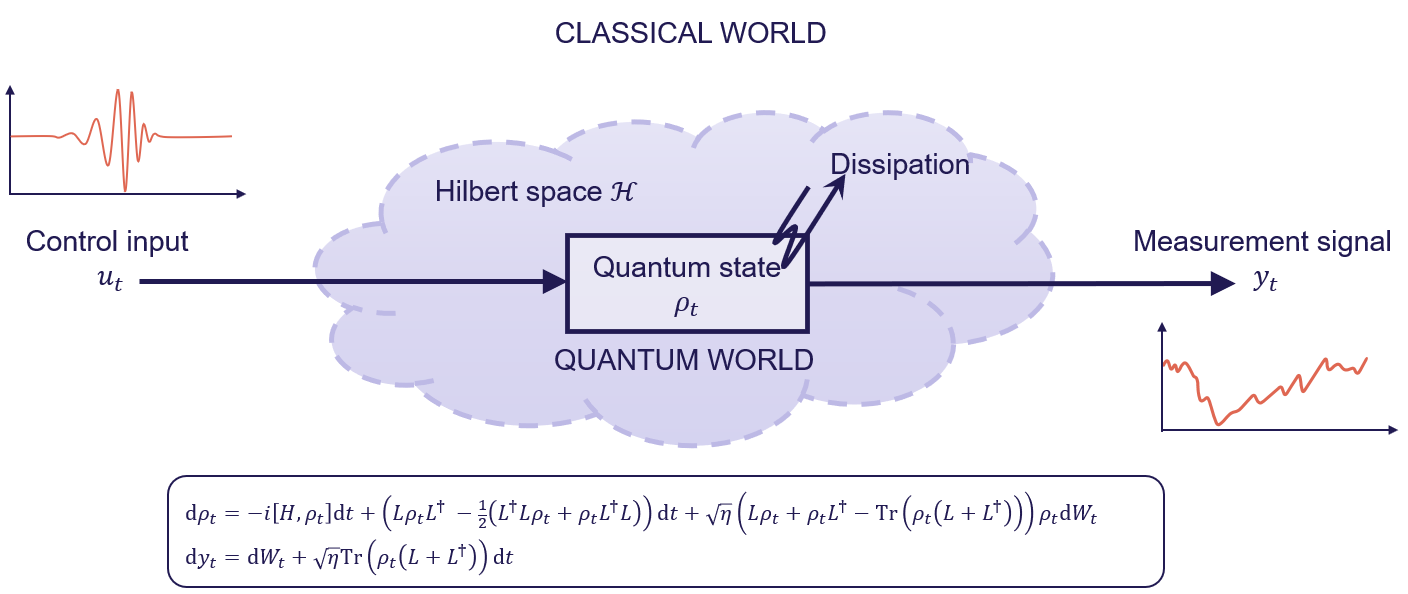The Q-Safe Project
The Q-Safe project aims to investigate the use of classical methods from control and learning to improve quantum information processing. To this end, we address various aspects of quantum theory such as feedback protocols for variational quantum algorithms and control and estimation of continuously monitored quantum systems.

Recent publications:
H. G. Clausen, P. Rouchon, and R. Wisniewski, “Online Parameter Estimation for Continuously-Monitored Quantum Systems.” IEEE Control Systems Letters, May 2024. doi: 10.1109/LCSYS.2024.3407608.
H. G. Clausen, S. A. Rahman, Ö. Karabacak, and R. Wisniewski, “Measurement-Based Control for Minimizing Energy Functions in Quantum Systems,” IFAC-PapersOnLine, vol. 56, no. 2, pp. 5171–5178, Nov. 2023, doi: 10.1016/j.ifacol.2023.10.111.
Henrik G. Clausen PhD fellow
Estimation and control of continuously monitored quantum systems
When quantum systems are subject to repeated or continuous measurements, the resulting dynamics may be described by a stochastic master equation. In this project, we study how the classical measurement signal available in such models may be used for stabilization of exotic quantum states and for real-time estimation of unknown dynamical parameters. To this end, we rely on techniques from stochastic systems, nonlinear control and optimization.
Salahuddin A. Rahman
PhD fellow
Quantum Algorithms for Optimization
Research objective:
To design hybrid quantum-classical algorithms for preparing eigenstates of Hamiltonians inspired by quantum control theory.
Tools and methods:
Quantum Lyapunov Control (Lyapunov stability, invariance principle).
Digital Quantum Simulation (Trotterized time evolution).
Quantum algorithms (Expectation estimation algorithms, overlap estimation algorithms, parameter-shift-rule, warm starting algorithms).
Recent publications:
Rahman, S.A., Karabacak, Ö. and Wisniewski, R., 2025. “Feedback-Based Quantum Strategies for Constrained Combinatorial Optimization Problems”. arXiv preprint arXiv:2502.14369.
doi: https://arxiv.org/abs/2502.14369Rahman, S.A., Karabacak, Ö. and Wisniewski, R., 2024. “Feedback-Based Quantum Algorithm for Constrained Optimization Problems.” Accepted for publication in the PPAM 2024 conference.
doi: https://arxiv.org/abs/2406.08169
Rahman, S.A., Karabacak, Ö. and Wisniewski, R., 2024. “Weighted Feedback-Based Quantum Algorithm for Excited States Calculation.” arXiv preprint arXiv:2404.19386. Accepted for publication in the QCE 2024 conference. doi: https://doi.org/10.48550/arXiv.2404.19386
Rahman, S.A., Clausen, H.G., Karabacak, Ö. and Wisniewski, R., 2024, June. “Adaptive Sampling Noise Mitigation Technique for Feedback-Based Quantum Algorithms.” In International Conference on Computational Science (pp. 321-329). Cham: Springer Nature Switzerland.
Rahman, S.A., Karabacak, Ö. and Wisniewski, R., 2024. “Feedback-Based Quantum Algorithm for Excited States Calculation.” arXiv preprint arXiv:2404.04620. doi: https://doi.org/10.48550/arXiv.2404.04620
Recent publications:
N. B. Dehaghani, A. P. Aguiar, R. Wisniewski, "State-Constrained Optimal Control for Coherence Preservation in Multi-Level Open Quantum Systems," Submitted for publication, arXiv: 2411.10840, November 2024.
N. B. Dehaghani, A. P. Aguiar, R. Wisniewski, and D. Q. Liu, "A Hybrid Quantum-Classical Approach to Complex Optimization Using a Variational Quantum Classifier," European Quantum Technologies Conference (EQTC), November 2024.
N. B. Dehaghani, A. P. Aguiar, and R. Wisniewski, "A Hybrid Quantum-Classical Physics-Informed Neural Network Architecture for Solving Quantum Optimal Control Problems," IEEE International Conference on Quantum Computing and Engineering (QCE24), September 2024.
N. B. Dehaghani, A. P. Aguiar, and R. Wisniewski, "Application of CRAB Algorithm for Enhanced Entanglement Synthesis," 16th APCA International Conference on Automatic Control and Soft Computing (CONTROLO), July 2024.
N. B. Dehaghani, A. P. Aguiar, and R. Wisniewski, "State Estimation and Control for Stochastic Quantum Dynamics with Homodyne Measurement: Stabilizing Qubits under Uncertainty," IEEE Access, March 2024. doi:10.1109/ACCESS.2024.3455170.
N. B. Dehaghani, and A. P. Aguiar, "Quantum State Transfer Optimization: Balancing Fidelity and Energy Consumption using Pontryagin Maximum Principle," 11th IEEE International Conference on Systems and Control (ICSC), October 2023. doi: 10.1109/ICSC58660.2023.10449792.
N. B. Dehaghani, A. P. Aguiar, and R. Wisniewski, "Exploring Strange Entanglement: Experimental and Theoretical Perspectives on Neutral Kaon Systems," Quantum Entanglement in High Energy Physics, InTechOpen, May 2023. doi: 10.5772/intechopen.1002527.
N. B. Dehaghani, A. P. Aguiar, and R. Wisniewski, "Quantum Pontryagin Neural Networks in Gamkrelidze Form Subjected to the Purity of Quantum Channels," IEEE Control Systems Letters (LCSS-CDC), March 2023. doi: 10.1109/LCSYS.2023.3286303.
Nahid Binadeh Dehaghani Postdoc fellow
Quantum Control and Optimization
Our research focuses on advancing the field of quantum control and optimization through a multidisciplinary approach that combines theoretical rigor and practical innovation. We investigate the dynamics of quantum systems under continuous monitoring using stochastic master equations, aiming to stabilize exotic quantum states and enable real-time estimation of unknown parameters. Employing techniques such as optimal control, physics-Informed neural networks, and hybrid quantum-classical frameworks, we develop robust solutions for coherence preservation, entanglement enhancement, and control of quantum states. These efforts are applied to a variety of problems, including state-constrained control of multi-level quantum systems, quantum sensing in entangled networks, and fidelity optimization in quantum state transfer. By bridging the gap between foundational research and real-world applications, our work contributes to the development of scalable, high-precision quantum technologies for computing, communication, and sensing.
Contact Us
Prof. Rafal Wisniewski
Henrik G. Clausen
Salahuddin A.Rahman













